Customers always ask me, “What about SEO?”
They say I haven’t mentioned the SEO or local SEO and our digital strategy, and they want to know whether it’s essential or not.
The reason I don’t present an SEO/Content Marketing strategy to them is that you need a Metric Shit Ton of Money to win at the SEO game. Not many people are ready to tell you that, especially those trying to sell the SEO services.
The business owner often replies, “What do you mean I don’t have enough money? I thought it was cheap and easy to rank up in SEO?”
Let’s take a look at what’s happened in the last five years.
Let’s choose a plumber as an example. A business owner says “I want to show up when someone is looking for a plumber. Shouldn’t we use the “near me” expression because it’s up 500%?”
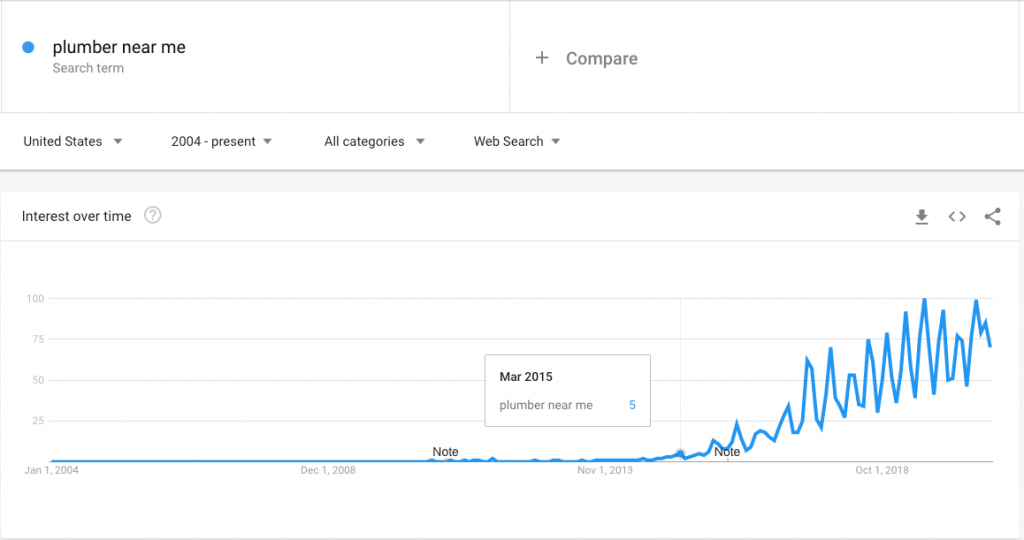
Google Trends – Plumber Near Me
Yes, of course you want to be recognized as “near me.” Those “near me” searches are up because of people’s mobile phone usage going up like crazy. You can see for yourself on Google Trends.
So let’s look at what the search results page looks like for the term “plumber near me.” The first thing we see is Google’s paid advertising for Local Services. Then we get Google AdWords (more paid advertising). Then we get Google My Business rankings. Then we get to position one and and you’ll notice I’ve underlined some URLs like Yelp. And then we get Featured Snippets.
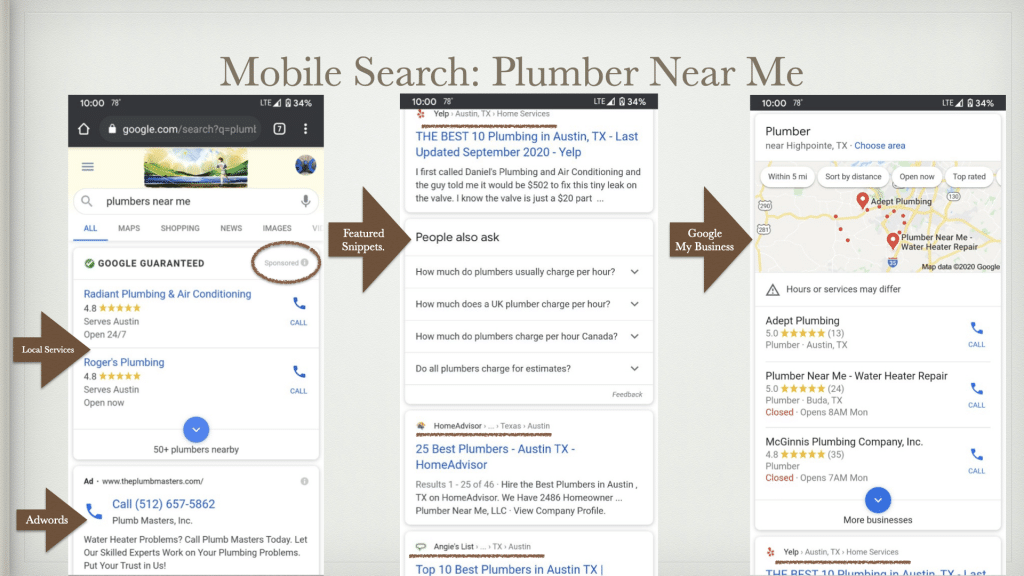
Plumbers Near Me – Mobile Search
On a mobile phone, it’s not very much different. And here you’ll see HomeAdvisor and Angie’s List showing up in the search results.
Those companies are aggregators.
They’re compilers. They bring together a whole bunch of home services. There are other aggregators out there, but we’re going to focus on the Home Services one because we chose the example of plumbing.
Right now, there’s a war going on on the internet called the aggregator war. They’re all fighting it out with one another. We’ve got Google with their Google Local Services. Google with Google AdWords. Google with Google My Business. Those are all aggregation. Then you’ve got Angie’s List, Yelp, Thumbtack, HomeGuide, Houzz, and HomeAdvisor in the home services space alone. All are trying to aggregate and help you find the plumber near you.
How’s this war being fought? With money. The investor money is spent on content marketing. Content marketing is SEO marketing: build a page, get it to rank. They’re also spending the investor money on online and offline advertising. Specifically with Google AdWords online, they’re driving up the price of clicks. Now, if you do AdWords advertising and you’re up against an aggregator, you’re paying more for the same click than you were before.
Their whole goal is to dominate page one and spend as much money as they need to dominate page one.
Let’s take a look at one of these aggregators, Angie’s List. Angie also owns Angie’s Home Services, another publicly-traded company, better known as HomeAdvisor and HomeStars.
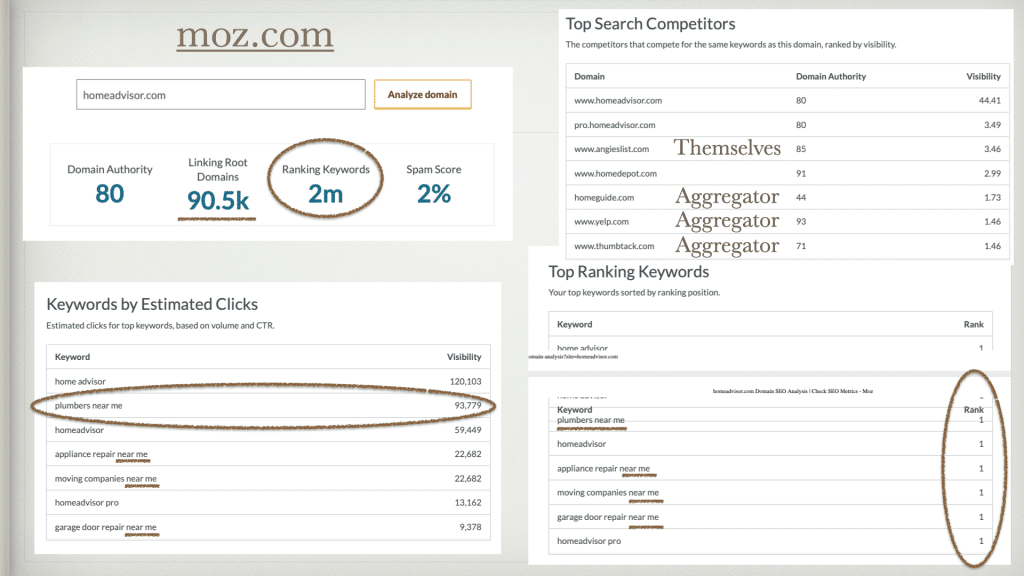
HomeAdvisor Content Marketing Search Engine Optimization
When you go to a tool like Moz.com you can put in one of these aggregator domains, and you’ll find out some interesting things like they rank 2 million keywords. That’s a crazy amount of content to be recognized for. And they’ve got 90,000 domains linking back to them. That’s a ton of backlinks.
Here are some of the keywords that they’re plugged into. You can see they own “plumbers near me,” which is why they’re my example.
Here are their top search competitors. These are the people that are trying to fight for position number one with them. Angie’s List themselves. Home Guide (another aggregator). Yelp (another aggregator). And Thumbtack (another aggregator). Home Depot is a store and an aggregator because it also will help you connect with a plumber. But right now HomeAdvisor owns and ranks number one for “plumbers near me.”
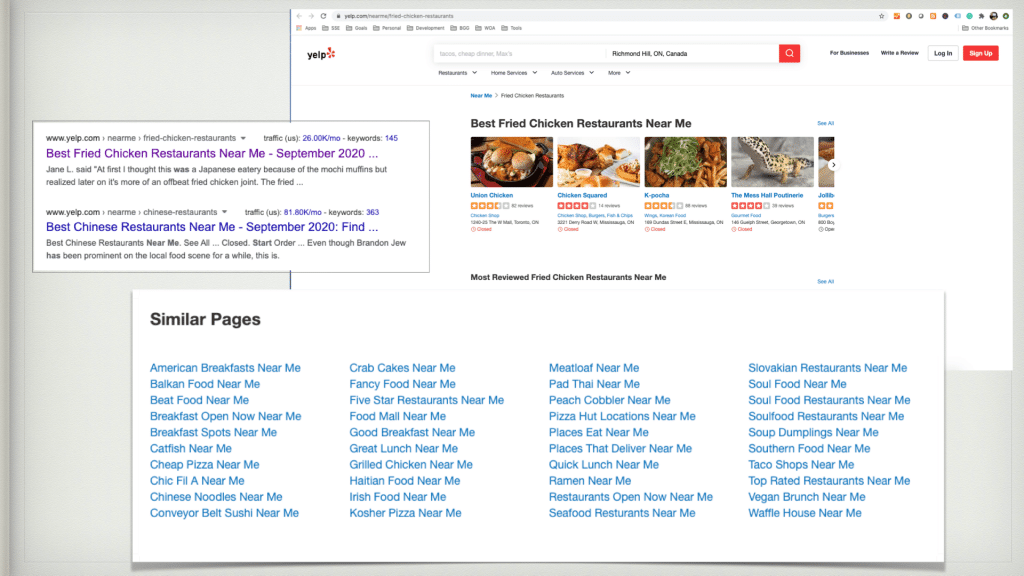
Here’s a Yelp page. You can see their focus on “near me.”
The aggregators are taking the clicks and the eyeballs away from the small business. It is bringing them to the aggregator with the sole purpose of getting the shopper on their site so they can sell the lead to somebody else.
That’s how the aggregator makes money: they sell leads.
You might be familiar with some other aggregators like Expedia, UberEats DoorDash, Skip The Dishes, or Airbnb.
You’ll recognize, none of these companies make anything or provide any service, except for connecting you with somebody else that does. That’s an aggregator.
Businesses hooked on HomeAdvisor don’t like their leads because the leads get sold to three people simultaneously and they’re driving up the click cost. It’s like a vampire comes into your industry, sucks up the leads and the money, and leaves all the small businesses wondering what happened.
Others are doing it too. In the mattress space: Purple’s done it, they’ve run a content play. Casper’s done it: they’ve run content play. Leesa’s done it, they’ve run a content play.
Do you think you can win the SEO content war with that little toy knife?
You need tons of content and more relevant content to win that war. And more and better backlinks as a minimum to win that war. You need a content creation team dedicated to continually creating and monitoring your content. And that’s to beat your new competitor, the aggregator.
The aggregator is your competitor now, not the little guy down the street. And that’s to get you to the top of the search pile for an undecided customer. An uncommitted potential prospect click to your website. Wow, that’s a metric shit ton of work to get a click.
Or, you can focus on becoming thought of first and liked the most.
That’s what Wizard of Ads does. We help our customers get thought of first and liked the most. We direct everybody to your website through mass media marketing. So the visitor is arriving using your branded keywords. They’re already warmed up, and they’re friendly. You’re their plumber.
They already know a little bit about you because they’ve heard about you in the mass media marketing.
You can make your website convert better for them if they like you more. So you answer the warmed up visitor’s questions. We further the relationship using the embedded “brandable chunks” that we create for you. With “we believe” statements we help you create emotional bonds.
We fiercely protect your brand online. We search engine optimize for your brand keywords. We win the bid wars on AdWords for your brand keywords. We buy all the other possible domains, and we block everybody else out that may try to rip you off. And then we build competitive Google Adwords campaigns to steal clicks from your direct competitors.
Examples of brand keywords would be a company name like “SPL Parts” and then “company name and a keyword” to give you an idea of what brand keywords look like.
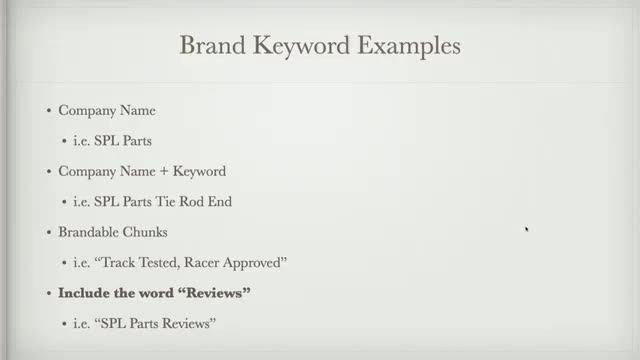
Grab the word “reviews”
Take this tip from this post. If you’re not buying this with Google AdWords or are not optimized for this keyword, you should be.
You want to leverage your social media content for social proof to show off what it is you do, and you do it well.
- You’re not afraid to show off your work: before, in progress, and after.
- You’re proud of your employees. You’re an excellent place to work.
- Your people are happy and they have personality.
- You’re hiring more like them.
- Customer Testimonials / reviews.
These are great things to create social media content & social proof that gives your company emotional benefits and takes it from being a cold thing to a warm thing.
Protect your brand
Create congruence in the positive identity of businesses by embedding your “brandable chunks” and “we believes” across different elements of your marketing and customer experience.
The moral of the story is, you should own your page one associated with your brand. You should have the top ad. Your social media should show up on those search results. And your business should show up with Google My Business at the top of any searches related to your broader marketing terms and brand identity you’ve carved out for yourself.
There was a time, a long time ago, when the most accessed website — the number one website in the world — literally ran out of my apartment. But today, it’s not so easy.
If you’ve got questions, just reach out.
- Social Media Sucks Today - July 19, 2024
- Happy Happy, Joy, Joy - June 19, 2024
- I hope I can turn you into a fan! - October 19, 2023
